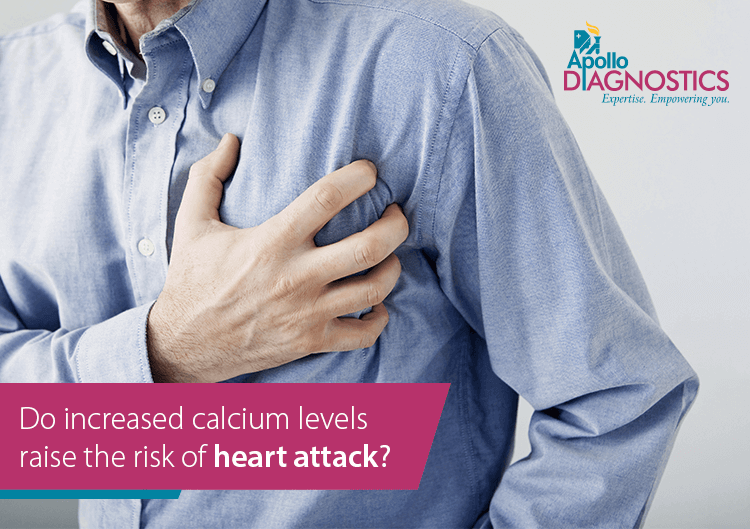Elevated Calcium: A risk factor for heart attack?
Jun 04, 2020

We grow up hearing about the importance of minerals in our daily diet. We know that calcium is responsible for keeping our bones and teeth strong and healthy. But how many of us pay attention to the consequences of consuming too much of a good thing, in this case, calcium?
Hypercalcemia, ironically, can weaken the bones and create kidney stones. In fact, new studies are trying to determine whether high levels of calcium in the bloodstream increase the risk of heart attack and of developing coronary artery disease. Though only in rare cases – and that too at a severe level – hypercalcemia can cause palpitations and fainting and cardiac arrhythmia, among other heart function problems. Hypercalcemia occurs due to overactive parathyroid glands, apart from cancer, medication, and calcium and vitamin D supplements.
However, the connection between high calcium levels and heart disease has not been firmly established. The nearest link is the possibility that the calcium in supplements can reach the fatty plaques in the arteries, causing them to harden, and thereby increase the risk of heart disease. Researchers often use a test called coronary artery calcium (CAC) scan to look for early signs of heart disease, but no direct connection exists between the calcium here and the calcium consumed.
and the calcium consumed.
 and the calcium consumed.
and the calcium consumed.Though researchers have studied and explained the important role played by calcium in blood clotting, muscle contraction, and blood pressure regulation, they also admit that a causal link between high calcium content and heart attack cannot be proven. Most of the earlier research has been observational in nature and the results were also inconclusive. In an experiment that used six different genetic variants related to calcium in the system, it was found that higher calcium concentration in the blood could be linked to heart attack and coronary artery disease. This, however, could only associate the disease to lifelong genetic exposure to increased calcium levels in the serum. It is still unclear if the result holds true for short- and medium-term calcium supplementation as well. Results of 31 different studies upon this subject were pooled together and analysed, but did not reveal any cause for concern. Randomized trials of calcium supplements also do not display a link to heart disease.
The recommended dose of calcium per day is 1000 mg up to the age of 50. For women over 50 and men over 70, the requirement is 1200 mg per day. Natural sources of calcium include milk, yoghurt, cheese, tofu, green leafy vegetables, etc. It is recommended that you get your primary supply of calcium from these natural sources, since supplements come with side effects such as constipation and the possibility of kidney stones – even if the link to heart disease hasn’t been established. If your body cannot tolerate lactose in natural sources of calcium, then you may need to resort to supplements. But taking a supplement of over 1000 mg daily would be an excess that doctors caution against.
Thus, it cannot be said for sure if higher calcium levels actually increase the chances of getting a heart attack. It is not even confirmed whether calcium supplements are responsible for any disturbance in the heart function. Nevertheless, it is always best to depend on natural sources for daily nourishment, and minimise the supplement intake or keep it within recommended levels.
To keep a track of your calcium levels, book an appointment at your nearest Apollo Diagnostics centre for an accurate and professional diagnostic experience. You can also choose to opt for a convenient home collection service.
Related Blog Post
Blog Categories
- Child Health
- Mens Health
- Women's Health
- Mental Health
- Health Myths & Facts
- Fitness
- Nutrition/Recipes
- Remedies
- Weight Management
- Stress Management
- Health Supplements
- Addiction Management
- Disease Management
- Allergy
- Anemia
- Arthritis
- Asthma
- Autoimmune Diseases
- Blood Pressure
- Cancer
- Deficiencies
- Dengue/Malaria/Chikungunya
- Diabetes
- Eye Problems
- Heart Diseases
- Hepatitis
- HIV/AIDS/STD
- Hormonal Imbalance
- Infection/Flu/Viral
- Kidney
- Liver
- Menstrual Problems
- Pregnancy
- Skin & Hair Problems
- Stomach Ailments
- Thyroid
- Others
- Health Checkups
- Diagnostics/Pathology
- Lifestyle & Wellness
- Covid
- Medical Tests
- Cholesterol
- Health Tips
- Parent Care/Old Age
- Lungs
- Food Intolerance








